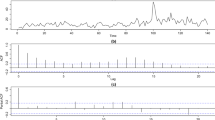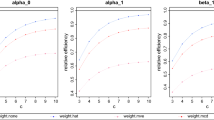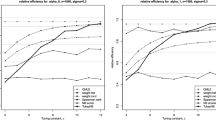Abstract
The Poisson integer-valued GARCH model is a popular tool in modeling time series of counts. The commonly used maximum likelihood estimator is strongly influenced by outliers, so there is a need to develop a robust M-estimator for this model. This paper has three aims. First, the authors propose a new loss function, which is a hybrid of the tri-weight loss for relatively small errors and the exponential squared loss for relatively large ones. Second, Mallows’ quasi-likelihood estimator (MQLE) is proposed as an M-estimator and its existence, uniqueness, consistency and asymptotic normality are established. In addition, a data-adaptive algorithm for computing MQLE is given based on a data-driven selection of tuning parameters in the loss function. Third, simulation studies and analysis of a real example are conducted to illustrate the performance of the new estimator, and a comparison with existing estimators is made.
Similar content being viewed by others
References
Ferland R, Latour A, and Oraichi D, Integer-valued GARCH process, Journal of Time Series Analysis, 2006, 27: 923–942.
Fokianos K, Rahbek A, and Tjøstheim D, Poisson autoregression, Journal of the American Statistical Association, 2009, 104: 1430–1439.
Zhu F and Wang D, Estimation and testing for a Poisson autoregressive model, Metrika, 2011, 73: 211–230.
Zhu F and Wang D, Empirical likelihood for linear and log-linear INGARCH models, Journal of the Korean Statistical Society, 2015, 44: 150–160.
Cui Y and Wu R, On conditional maximum likelihood estimation for INGARCH(p, q) models, Statistics and Probability Letters, 2016, 118: 1–7.
Zhu F, A negative binomial integer-valued GARCH model, Journal of Time Series Analysis, 2011, 32: 54–67.
Zhu F, Modeling overdispersed or underdispersed count data with generalized Poisson integer-valued GARCH models, Journal of Mathematical Analysis and Applications, 2012, 389: 58–71.
Zhu F, Zero-inflated Poisson and negative binomial integer-valued GARCH models, Journal of Statistical Planning and Inference, 2012, 142: 826–839.
Davis R A and Liu H, Theory and inference for a class of nonlinear models with application to time series of counts, Statistica Sinica, 2016, 26: 1673–1707.
Davis R A, Holan S H, Lund R, et al., Handbook of Discrete-Valued Time Series, Chapman and Hall/CRC, Boca Raton, 2016.
Kang J and Lee S, Minimum density power divergence estimator for Poisson autoregressive models, Computational Statistics and Data Analysis, 2014, 80: 44–56.
Kim B and Lee S, Robust estimation for zero-inflated poisson autoregressive models based on density power divergence, Journal of Statistical Computation and Simulation, 2017, 87: 2981–2996.
Li Q, Lian H, and Zhu F, Robust closed-form estimators for the integer-valued GARCH(1,1) model, Computational Statistics and Data Analysis, 2016, 101: 209–225.
Mukherjee K, M-estimation in GARCH models, Econometric Theory, 2008, 24: 1530–1553.
Iqbal F and Mukherjee K, M-estimators of some GARCH-type models; computation and application, Statistics and Computing, 2010, 20: 435–445.
Elsaied H and Fried R, Robust fitting of INARCH models, Journal of Time Series Analysis, 2014, 35: 517–535.
Kitromilidou K and Fokianos K, Mallows’ quasi-likelihood estimation for log-linear Poisson autoregressions, Statistical Inference for Stochastic Processes, 2016, 19: 337–361.
Amemiya T, Advanced Econometrics, Harvard University Press, Cambridge, 1985.
Taniguchi M and Kakizawa Y, Asymptotic Theory of Statistical Inference for Time Series, Springer, New York, 2000.
Jensen S T and Rahbek A, Asymptotic inference for nonstationary GARCH, Econometric Theory, 2004, 20: 1203–1226.
Xiong L and Zhu F, Robust quasi-likelihood estimation for the negative binomial integer-valued GARCH(1,1) model with an application to transaction counts, Journal of Statistical Planning and Inference, 2019, 203: 178–198.
Jiang Y, Wang Y, Fu L, et al., Robust Estimation using modified Huber’s functions with new tails, Technometrics, 2019, 61: 111–122.
Wang X, Jiang Y, Huang M, et al., Robust variable selection with exponential squared loss, Journal of the American Statistical Association, 2013, 108: 632–643.
Cantoni E and Ronchetti E, Robust inference for generalized linear models, Journal of the American Statistical Association, 2001, 96: 1022–1030.
Toma A and Broniatowski M, Dual divergence estimators and tests: Robustness results, Journal of Multivariate Analysis, 2011, 102: 20–36.
Warwick J, A data-based method for selecting tuning parameters in minimum distance estimators, Computational Statistics and Data Analysis, 2005, 48: 571–585.
Kitromilidou K and Fokianos K, Robust estimation methods for a class of log-linear count time series models, Journal of Statistical Computation and Simulation, 2016, 86: 740–755.
Czado C, Gneiting T, and Held L, Predictive model assessment for count data, Biometrics, 2009, 65: 1254–1261.
Brockwell P J and Davis R A, Time Series: Theory and Methods, 2nd Edition, Springer, New York, 1991.
Author information
Authors and Affiliations
Corresponding author
Additional information
This paper was supported by Research Start-up Fund of Changchun Normal University, Natural Science Found of Changchun Normal University under Grant No. 2018-004, the National Natural Science Foundation of China under Grant Nos. 11871027 and 11731015, Cultivation Plan for Excellent Young Scholar Candidates of Jilin University.
This paper was recommended for publication by Editor LI Qizhai.
Rights and permissions
About this article
Cite this article
Li, Q., Chen, H. & Zhu, F. Robust Estimation for Poisson Integer-Valued GARCH Models Using a New Hybrid Loss. J Syst Sci Complex 34, 1578–1596 (2021). https://doi.org/10.1007/s11424-020-9344-0
Received:
Revised:
Published:
Issue Date:
DOI: https://doi.org/10.1007/s11424-020-9344-0




